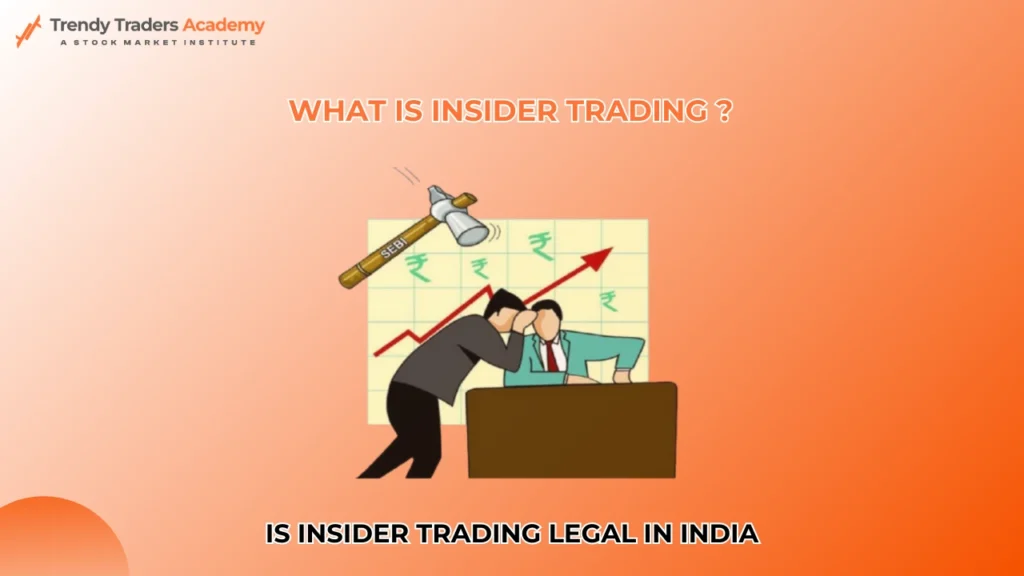
What is Insider Trading ? Is Insider Trading Legal in India
Insider trading is a Securities fraud in particular is usually described as the purchase and selling of equity or securities in a publicly traded corporation based on information which is not readily available to the public. It is wrongful because some people make high profits in a very short time which is unlawful and immoral because it hampers the justice of markets. The legal provisions relating to market insider-trading have progressively changed with time adapting the global standards for the Indian environment. This blog looks into the jurisdiction of insider-trading in India; current laws; notable cases; issues and solutions; and future progression.
What is Insider Trading ?
It entails the process by which people who are privy to special information regarding a particular company engage in dealing in securities with the view of making profits. Some of the internal members may be company executives, employees, directors while the outsiders can be consultants or analysts who have such information.
Types of Insider Trading
Legal Insider Trading: When insiders are trading in their corporation’s stocks but the details of trades are reported to the regulatory agencies as required by the law.
Illegal Insider Trading: Trades made on the basis of material, non-public information and are not disclosed and violate the laws.
Is Insider Trading Legal in India ?
Yes but insider-trading is illegal if it involves dealing with stock on the basis of UPSI in India. The practice is unlawful under the SEBI (Prohibition of Insider-Trading) Regulation, 2015 since its provisions are meant to check unfair trade practices from dominating the stock market and protect the interests of all stakeholders investors included.
When is Insider Trading Illegal in India
Insider trading is considered illegal when:
Unpublished Price-Sensitive Information (UPSI): It is carried out with information about the company that will became public in the future but it is not available at the moment. Such information may include mergers acquisitions, financial performance information, or information about new important contracts.
Insider: It must be done by a person who comes under the shed of what we call ‘inside person,’ directors, employees, consultant or any person who has access to UPSI.
Breach of Fiduciary Duty: The insider leverages the disclosed information for his own gain thus being in violation of the contract between him and his company as well as the entity’s other stakeholders.
When is Insider Trading Legal in India
Insider trading can be legal if it adheres to SEBI’s regulations:
1. Trading Plans: Perhaps they can set up a pre-declared ‘trading plan,’ which SEBI allows in case:
- Unlike the traditional approach, the plan is made on the assumption of disclosure in advance.
- The trades are made only if there is the availability of a cooling-off period.
- The plan cannot be changed or abandoned during the operation of the plan.
2. Disclosures: Thus, insiders are also required to report the transactions to the company as well as SEBI in order to restore the transparency.
3. Public Information: As long as the information that the trader is using to make the trades is public, this is perfectly legal.
SEBI Regulatory Framework in India
The regulation of insider-trading is well tackled in India by the body known as the Securities and Exchange Board of India abbreviated as SEBI. To tackle this vice, over the years, SEBI has developed strict measures so as to protect fairness in the market.
Insider Trading Regulations SEBI
Here are some Insider-Trading Regulations SEBI
Prohibition of Insider Trading Regulations SEBI, 1992
These were the first omnibus rules put in place in order to address insider trading.
Stipulated inside traders, price-relevant information, and connected persons.
Sought to fine offenders.
Prohibition of Insider Trading Regulations SEBI, 2015
Replace the 1992 regulation in order to generalize to the changing market conditions.
Expanded the interpretation of who is an ‘insider’, as well as ‘unpublished price sensitive information.
Proposed recommendations for trading plans so that insiders could trade legally without violating the law.
Provided for the establishment of an effective internal control structure within companies to check sharp practices as insider trading.
Changes to the 2015 Regulations
However, SEBI has over the years tweaked these regulations to increase control measures. Key amendments include:
More focus on delineating the digital records of people privy to UPSI.
More transparency of rules related to trading in securities of such personnel who have been declared as designated persons.
Enhancements of the roles of whistleblowers as a way of ensuring that they report violations.
Landmark Cases of Insider Trading in India
Some of the most publicised instances of insider-trading in India thereby have raised awareness about this evil practice. Below are some notable examples:
Hindustan Lever Ltd. (HLL) Case (1998)
Hindustan Lever Ltd In this case, let us discuss that one of the strategic business units of Unilever was Hindustan Lever Ltd.
instances, insider trading charges were levied against the Hindustan Lever Ltd. (currently known as Hindustan Unilever) which bought shares in Brooke Bond Lipton India prior to the merger message and with reference to UPSI.
SEBI held HLL guilty and imposed a penalty on the company, which became a significant case due to its thrust towards the principle of correct disclosures.
Rakesh Agrawal vs. SEBI (2004)
ABS Industries Managing Director Rakesh Agrawal was alleged to have traded shares using UPSI concerning a takeover bid by Bayer AG.
It demonstrated issues of sufficiency of evidence and intent as crucial factors critical to insider trading prosecution.
Vijay Mallya and United Spirits Case (2017)
Vijay Mallya was charged with insider information which involved selling of United Spirits shares.
SEBI passed an order taking Mallya out of operation and restricted him from the securities market.
What are the difficulties to fight against insider trading ?
Despite the robust regulatory framework, several challenges hinder the effective prevention of insider-trading in India:
- Detection and charging
- Insider trading can be executed by anyone wealthy enough and plugged into powerful software – it cannot be easily detected.
- This brings the problem of the fact that proving the misuse of UPSI in court involves efforts that entail the presentation of evidence which may be hard to come across.
- Whistleblower Mechanism
- Despite SEBI efforts in enhancing the whistleblower mechanism, concerns based on retaliatory action and ignorance among employees put off individuals from reporting the violations.
- Globalization of the financial markets.
- The presence of cross border trading and international operations creates problems with respect to jurisdiction and enforcement.
- Technological Advancements
- For instance, the application of high frequency trading, technological architectures and dark pools complicates the monitoring of insider trading conducts.
- Lack of Awareness
- A number of workers and sometimes even managers are still not aware of many of the variable laws of insider trading which makes them, sometimes, violate it accidentally.
SEBI's Role and Measures
SEBI has taken proactive measures to address these challenges:
Technology Integration
- Application of AI and big data for analysis of trading activity and identifying suspicious behavior.
- Proposing trading surveillance systems.
Awareness Campaigns
- Organizing seminars and workshops to avail stakeholders of laws that govern insider-trading.
Collaboration
- Coordinating with the international regulatory authorities such as being a case in the U.S. Securities and Exchange Commission (SEC).
Penalties
- Coercing it with severe sanctions in an effort to discourage any entity interested in violation.
Global Comparisons
As far as insider-trading regulation is concerned India has a comparable model to the international standards. However, there are nuances:
United States
- The SEC actively opposes cases of insider trading to the highest level.
- There are severe consequences, such as imprisonment, as a rule.
- Bounties are the rewards given to the whistleblowers.
United Kingdom
- Insider trading is regulated through the Financial Conduct Authority (FCA).
- There is focus on corporate behavior, and all ethical aspects.
India vs. Global Practices
- Here SEBI regulations are fine but enforcement is a different ball game compared to other countries like the U.S.
- There is a scope for India to enhance the legislation of WhistleBlower Rewards to enhance reporting.
The Way Forward
To curb insider trading effectively, India needs to adopt a multi-faceted approach:
Strengthening Enforcement
The SEBI should develop the necessary sup-port structures and it should allocate improved technology applications and resources in the enforcement.
Encouraging Whistleblowers
Like the U.S has done through offering serious monetary incentives to persons who report such cases, the introduction of monetary incentives would enhance reporting of such practices.
The next strategic issue that needs improvement in regards to corporate governance is the following:
Companies should employ strong internal measures to prohibit the relaying of UPSI, in this component and in other parts of the company.
Training and Awareness
Ensuring that training is held frequently for its employees and other stakeholders is also good enough in minimizing … What is referred to as ‘unintentional’ violation.
International Collaboration
It is with the cooperation with foreign regulators that questions of jurisdiction can be handled.
Leveraging Technology
High-technology equipment is used in monitoring the flow of trade as a way of identifying any illegitimate trading activities once they occur.
Conclusion
Insider trading is socially wrong, which breaks the ethics of the financial markets, and also deals with the morale of the investors. In spite of these accomplishments, India has not left untouched by the various problems in regulating and preventing insider trading. Here enforcement, awareness alongside leveraging on technology can assist in ensuring that the market is fair to everyone. Thus, the further steady improvement of SEBI regulation will require renewed active participation of companies and investors, as well as other players in the securities market to maintain the confidence of the investing public.
Also Read : Top Renewable Energy stocks in India
FAQ'S
What is insider trading ?
Insider trading involves buying or selling a company’s securities based on confidential, material information that is not available to the public. It gives an unfair advantage to those who possess such information.
How does insider trading impact the market ?
Insider trading distorts market fairness and transparency. It can harm investors who do not have access to insider information, leading to loss of trust in the market.
What are the insider trading regulations SEBI ?
The SEBI Prohibition of Insider Trading Regulations, 2015 govern insider trading in India. Key points include:
- Prohibiting trading based on unpublished price-sensitive information (UPSI).
- Requiring disclosures of trading activities by insiders.
- Mandating companies to maintain a code of conduct for handling insider information.
What are the penalties for insider trading in India ?
penalties for insider trading in India include fines up to ₹25 crore or three times the profit gained, imprisonment for up to 10 years, or both, as per SEBI regulations.
Is insider trading legal in India ?
No, insider trading is illegal in India. SEBI imposes strict penalties, including fines, market bans, and imprisonment for individuals found guilty of insider trading.










